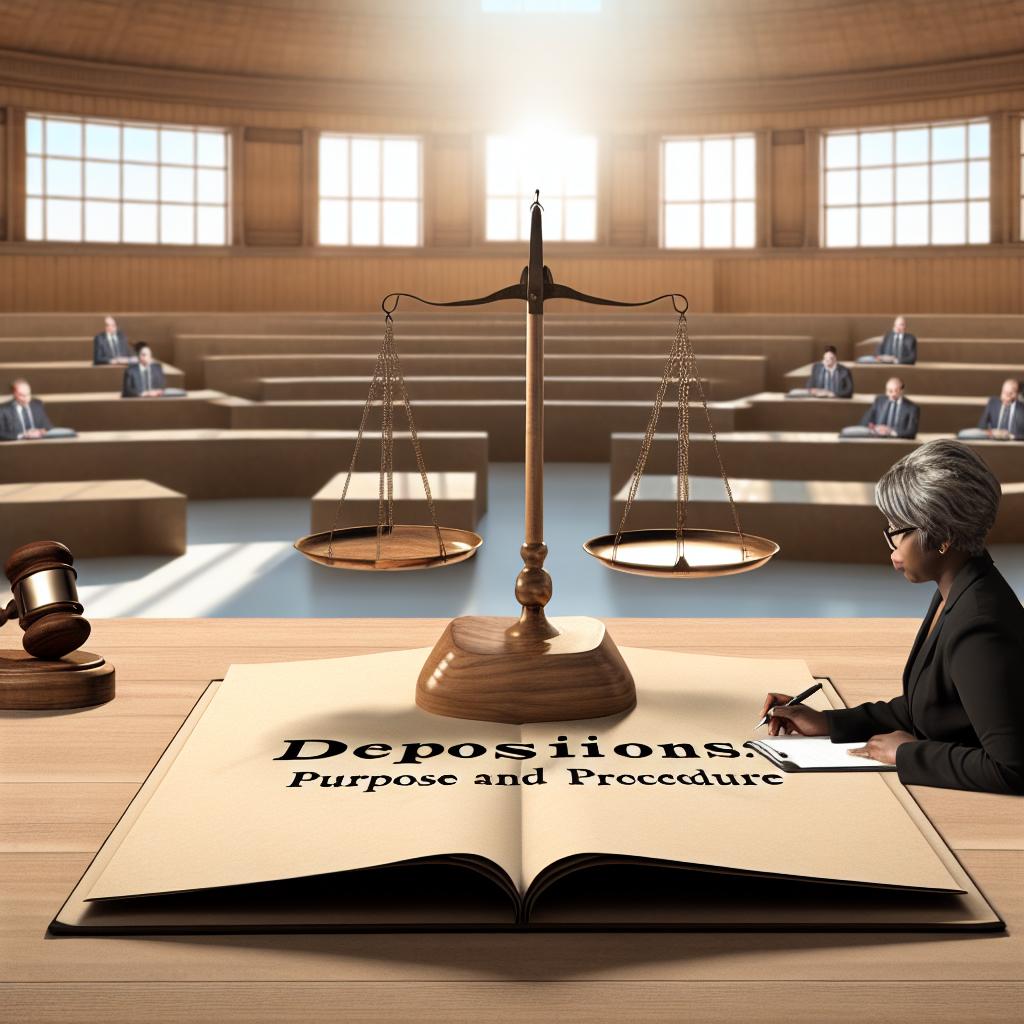Understanding Depositions
Depositions serve as an integral component of the legal discovery process. By allowing lawyers to take sworn testimony from witnesses outside of the courtroom, they help shape the course of litigation considerably. This process facilitates a deeper understanding of the facts surrounding a case, while also playing a vital role in clarifying disputes. By leveraging depositions, lawyers can either guide their cases toward settlement or ensure that courtroom proceedings are more focused and efficient.
Purpose of Depositions
The fundamental aim of a deposition is to acquire sworn testimony from a witness, which is often documented by a court reporter. This testimony is invaluable to both parties involved in a legal dispute as it aids in understanding the entirety of the evidence available. Additionally, it enables attorneys to assess both the strengths and weaknesses inherent in their cases. By providing an advance look at potential trial testimonies and preserving these statements for future reference, depositions help eliminate unexpected developments during trial. They also offer a mechanism to impeach or contradict a witness if their testimony deviates when presented in court.
Procedural Aspects
Understanding the procedural nuances of depositions is key to appreciating their role in legal proceedings. This section will explore essential procedural elements, including the role of preparation and the rules surrounding objections.
Preparation and Notice
Before a deposition can occur, the attorney who intends to question the witness must serve them with an official notice. This notice includes details such as the time, date, and location where the deposition will occur. The primary role of this notice is to afford the deponent adequate time for preparation. As such, the witness is expected to be ready to clearly and accurately present the necessary information. Likewise, attorneys dedicate significant periods to prepare thoroughly for depositions. This preparation often involves reviewing relevant documents, drafting insightful questions, and generally devising a strategic approach to questioning.
Conducting the Deposition
Once the deposition begins, the witness—referred to as the *deponent*—takes an oath, after which their testimony is officially recorded. Both attorneys are given the opportunity to ask questions during the session. The attorney who issued the deposition request usually starts the questioning, followed by cross-examination from the opposing counsel. Queries posed can tackle a wide array of topics, from the very specific details pertinent to the case to broader aspects aimed at evaluating the witness’s credibility.
Objections and Rules
During the deposition, attorneys can voice objections to certain questions put forth. Typical grounds for objections might include claims of irrelevance, ambiguity, or violating confidentiality. However, most objections are merely noted for the record, allowing the witness to proceed in answering the questions. Exceptions do exist, particularly for inquiries that encroach upon privileged information or are excessively harassing. These specific circumstances might warrant instructing the witness not to answer.
After the Deposition
Upon the conclusion of a deposition, the entirety of the testimony is transcribed into a documented format. Both parties have the right to request copies of this transcript for their own review. Should any discrepancies or errors be discovered within the transcript, the deponent has an option to correct them, provided that a valid justification accompanies the corrections. This transcript often becomes a pivotal piece of evidence during the trial proceedings, especially in instances where it highlights inconsistencies within the witness’s vows.
The Impact on Trials
Depositions exert a substantial influence on trial strategies and outcomes. By providing clarity on facts and statements prior to trial, they enable parties to reassess and potentially revamp their legal tactics. This pre-trial preparation often leads to a refinement of the issues that are eventually presented in court. Moreover, the information uncovered during depositions frequently triggers settlements, as parties reevaluate the robustness of their positions based on the newly disclosed evidence.
Strategic Considerations
Legally, a deposition serves many purposes. However, its impact often depends on how effectively attorneys leverage the information gleaned. Lawyers commonly use depositions to evaluate the demeanor and credibility of a witness. By observing the deponent’s body language, listening to the tone of responses, and analyzing how answers are framed, legal teams can gather information that goes beyond the words spoken. Thus, strategic insights gained during depositions can significantly inform court arguments or negotiations for a potential settlement.
Furthermore, by trapping witnesses in specific statements during depositions, attorneys equip themselves with a powerful tool to use at trial. Should a witness present testimony that contradicts their deposition, their credibility can be challenged, thereby affecting the case’s outcome.
Technological Influences
In recent years, the format and accessibility of depositions have undergone significant changes due to technological advancements. Increasingly, video depositions are being utilized. This technology not only captures the words of the deponent but also provides visual records of their demeanor, enhancing the perception of how credible or reliable the testimony is. In some jurisdictions, remote depositions have gained acceptance, allowing parties from different geographical locations to participate through video conferencing tools. This technological shift not only saves costs and time but also broadens the scope and feasibility of conducting timely depositions.
Legal Evolution
Depositions continue to evolve as legal standards and expectations shift. Ongoing discussions within legal circles consider the role depositions play in balancing thorough discovery processes with concerns for efficiency and fairness. As transformative cases arise and as legislatures amend procedural rules, the manner in which depositions are conducted, recorded, and used at trial may see further refinements.
In conclusion, depositions are a key element of the legal discovery process. By acquiring and clarifying crucial evidence and evaluating witness credibility, they bolster fair and informed legal procedures, extending their influence well beyond the initial stages of litigation.
